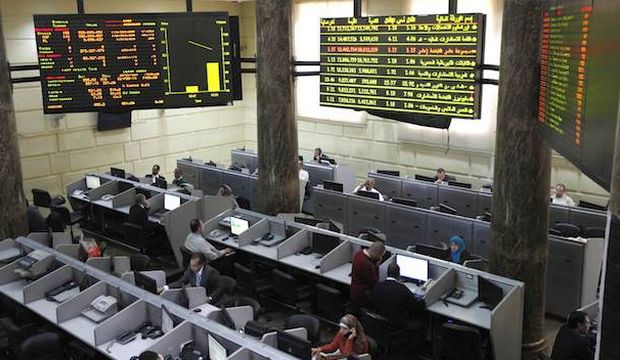
This file photo shows traders working at the Egyptian stock market in Cairo on February 2, 2014. (Reuters/ Mohamed Abd El Ghany/Files)
Cairo, Asharq Al-Awsat—There are currently no plans to privatize Egypt’s stock market either in the near or distant future, according to the head of the bourse.
Speaking on Wednesday on the second and final day of the 2014 Euromoney Egypt Conference in Cairo, Chairman of the Egyptian Exchange (EGX) Mohamed Omran told delegates there were currently no plans to privatize the EGX, one of the region’s largest exchanges, adding that it was unlikely any such plans would materialize “in the next 25 years.”
“The EGX is a strong and stable government institution,” and one of the Arab world’s “most open” exchanges, with governing rules and regulations that were the “best in the region,” Omran said.
He did, however, stress the need for cooperation between the EGX and the country’s private sector, saying that partnerships with private institutions over the exchange and development of expertise “could possibly happen” in future.
He said the bourse had not yet reached “the level we want,” and that it was still reeling from the compounded effects of a global financial crisis and the ousting of two of the country’s presidents in less than three years.
Despite this, he said, the EGX had performed well during the previous 18 months due to the efforts of brokerage firms and the announcement of the government’s development plans for the country’s economy.
He added that brokerages and financial institutions, as well as the national mega projects announced since the inauguration of President Abdel-Fattah El-Sisi—especially the expansion of the Suez Canal—would have a pivotal role to play in the coming period in helping revive the country’s lumbering economy by drawing in much-needed foreign and domestic investment.
Omran revealed there would be a number of new listings on the EGX in the coming period, though he added there would be a reassessment of the market’s listing procedures, with changes expected, in roughly a year’s time.
Egypt’s economy has been crippled since the country’s revolution in 2011. Inflation and unemployment have risen steadily, while foreign currency receipts have plunged on the back of falling tourism numbers and a steady exodus of investors.
The market’s benchmark EGX 30 index tumbled 16 percent on January 27, 2011, two days after the start of the protests that eventually unseated longtime president Hosni Mubarak, forcing it to close for almost two months in order to avoid a potential freefall.
Despite turbulence over the two years since then, the market has relatively stabilized. At the time of writing it has gained almost 30 percent of its value at the start of the year.
